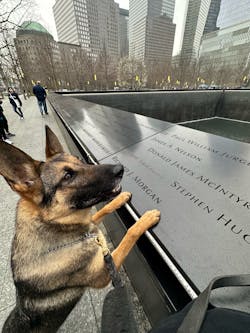TSA Canines Enhancing Security at John F. Kennedy International Airport
The Transportation Security Administration has several explosive detection canine teams working at John F. Kennedy International Airport (JFK), serving as key assets used to enhance airport security and keep passengers safe and secure.
The canines and their handlers were trained at TSA’s National Canine Training Center in San Antonio, Texas. The dogs were trained for 12 weeks as they learned to detect explosives and explosive materials in the busy transportation environment. The dogs sniff the air currents surrounding travelers and their belongings as they pass through the airport terminal in an effort to detect anyone who may be carrying explosives. In doing so, the canine teams assist with the efficiency and effectiveness of TSA’s screening operations.
Canines are an important layer in airport security because they increase TSA’s explosive detection capability. The procedures involve the increased use of the canines and the reconfiguration of checkpoint lines to allow for the passengers to walk past the dogs. This added screening measure enhances security and allows TSA to stay ahead of threats.
Passengers departing JFK International Airport can at any time expect to see the canine teams working around travelers. The teams capably navigate among large groups of people to pinpoint the source of an explosive odor, even if the source is mobile and often without the source being aware it is being tracked. The canine handlers are trained to read their dog’s change of behavior when it indicates an explosive scent has been detected.
If a dog alerts its handler to the presence of explosive odor, TSA follows an established procedure to resolve the alarm. The use of these highly-trained canines is an effective tool in deterring and detecting the introduction of explosive devices into the nation’s transportation systems.
Because explosives are known to be the greatest threat to the aviation system, the canines are regularly tested to ensure they maintain a high standard of operational effectiveness. This continual training allows for all teams to be a reliable resource in detecting an explosive threat, maintaining proper acclimation within the airport, and mitigating potential distractions in a busy transportation environment.
